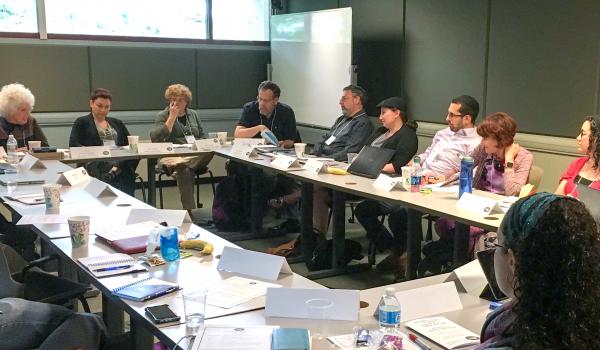One of my favorite aphorisms is “you don’t know what you don’t know.” This adage encapsulates what I have grown to love about Jewish educational research; namely that what we discover is always illuminating but never definitive. The next piece of conclusory evidence that will alter what we think we know is just beyond the next research question.
I was reminded of this truth when I recently gathered with colleagues at CASJE-sponsored Emerging Scholars Seminar at the 2017 Network for Research in Jewish Education (NRJE) conference. I was honored to be included with an engaging group of colleagues and mentors at various stages of honing our skills as researchers in Jewish education.
The Emerging Scholars seminar convened the day before the actual NRJE conference and was woven through it. This allowed the participants to interface and network with both their peers and with more seasoned colleagues over the course of the three days, and to process what we learned in the various conference sessions together. While there were several panels and programs for the participants as a group on aspects of work as researchers, the most useful component of the seminar for me was the opportunity to meet with my assigned mentor, Dr. Janet Aronson of Brandeis University.
There were two distinct categories of researchers in the seminar: those who were fully immersed in research as part of a career path in academic environments, and those who saw research efforts as complimentary to work as practitioners in some aspect of K-12 education. The seminar organizers appropriately matched the participants with mentors from these respective perspectives who shared commonalities in their work and backgrounds with their mentees. In my case, Janet and I are both communal professionals who began our academic research work mid-career and came from practitioner backgrounds in other fields. She works with Jewish communal organizations to do practical social science research that helps them better understand their constituencies; I work within a Jewish communal organization leveraging social science research to better strategically plan and deploy resources through a deeper understanding of our constituents. We each do important work to build the knowledge base of the Jewish people, but without an opportunity such as the seminar we may never have interacted to talk shop and, in my case, seek advice. Janet allowed me to share my challenges in conducting educational research in the agency setting while offering insight on how to better advocate to other communal professionals about its value and necessity.
Beyond the Emerging Scholars seminar, the larger NRJE conference offered many substantive takeaways, including the value of practitioner-based research as championed by Drs. Meredith Katz and Jeffrey Kress of the Davidson School at The Jewish Theological Seminary, Miriam Heller Stern of Hebrew Union College-Jewish Institute of Religion, and Sharon Feiman-Nemser of Brandeis University, among others. As one of the few researchers at the conference whose work environment is not primarily an academic setting, I repeatedly am struck by the amount of informative research in Jewish education that fails to trickle out of the ivory tower into the ears of educators on the ground. Those of us who participate in these types of research conferences read academic journals and trade periodicals, and probably periodically skim databases such as Proquest for the latest dissertation findings. We naturally find value in research and try to stay current on it because it directly impacts our own work as researchers.
However, we still lack a good vehicle for consistently distilling research findings into useful and accessible information for the educators and teachers on the ground. Practitioner-based research offers a partial answer to this problem. And while it is not a new idea in education research, it is becoming a more common and respected form of research in Jewish education. By activating educators in the field to be a part of the research process, they are engaged in its purpose and come to better understand its value to their work. While this form of research has challenges—it has limitations in terms of generalizability and sometimes methodological rigor—it also helps narrow the gap between “town and gown,” and promotes increased knowledge among practitioners as valuable professional development alongside the more dominant emphasis on skills improvement. Moving forward, I hope to amplify the importance and practical application of research for educators in my own educational community in Chicago. Who knows what new findings, or which new thinker, could emerge from a culture change like that among our local educators?
Scott Aaron is Executive Director of the Community Foundation for Jewish Education of the Jewish United Fund of Metropolitan Chicago.


